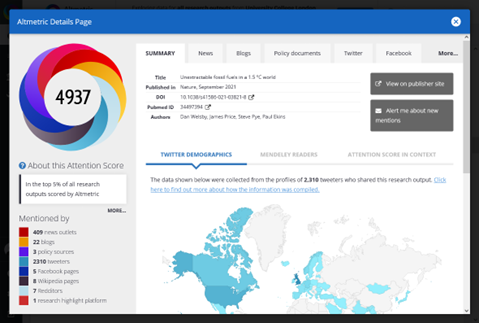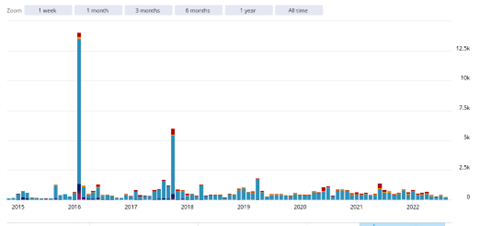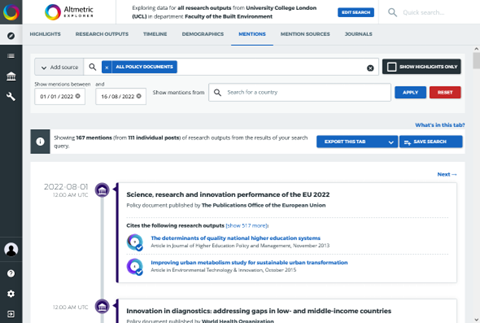Altmetric – now available at UCL!
By Kirsty, on 2 September 2022
Guest post by Andrew Gray (Bibliometrics Support Officer)
What is it?
Altmetrics are the concept of “alternative metrics” – measuring the impact of research beyond scholarly literature. It encompasses a wide range of activity in diverse sources social media (eg twitter, blogs), news publications, and grey literature (eg policy documents). This can help to get a wider sense of the impact of papers that might otherwise be missed were we to focus just on traditional academic citations.
The primary commercial database for these is Altmetric (https://altmetric.com) – UCL has just taken out a one-year subscription to this service. We hope it will be useful for anyone interested in public engagement or research impact, as well as individual researchers looking at the response to their own work.
It is open to everyone at UCL by visiting https://www.altmetric.com/explorer/login and entering your UCL email address. It will then authenticate through the UCL single-sign-on system.
How does it work?
Altmetric tracks a range of individual sources looking for DOIs, links to papers, or free-text descriptions of articles. It then matches these to the underlying paper and produces an index of the mentions. Here we can see the range of responses to a climate-change study.

You will also sometimes see this coloured “doughnut” on publisher or repository sites – clicking through will get you to this same page.
The most interesting part of the service, however, is the dashboard. This aggregates the results from all individual papers, and we can then filter down by subject area, date, publication venue, etc., to produce a more specific analysis. It is also possible to search for keywords to see the change in activity around a specific topic – one like “artificial intelligence” tends to show a steady level of interest, while one like “gravitational waves” shows very dramatic spikes connected with major discoveries.
What can we do with it?
The dashboard has been integrated with UCL’s RPS service, so it has a dataset of UCL papers since 2013, each linked to the faculty/department of the authors. This means we can do the same types of analysis for just UCL papers – or just those from a specific department or a specific author.
The search can also be tweaked to identify specific topics. Here we can see policy documents published in 2022 which cite a Bartlett paper.
Policy documents are one of the key strengths of Altmetric – they can be used as evidence of wider impact, especially for the social sciences. While they are formal documents, and very distinct from more ephemeral news or social media mentions, they are not indexed in most citation databases and so this impact can often be hard to trace.
Altmetric data can also be exported – any set of results can be exported so that we can do detailed offline analysis of sets of papers, or at the individual mentions that make up the score. This data includes identifiers such as DOIs and ISBNs, meaning it can be linked up to other datasets easily
What next?
We are very keen to get this tool in the hands of as many people at UCL as possible and find how it can be used most effectively. Please have a go and let us know what you think!
UCL-specific training and guidance is currently under development, and will be published in September 2022. Until then, please feel free to get in touch with the team (bibliometrics@ucl.ac.uk) with queries or requests for assistance. We are happy to arrange training as well.
The tool is currently provided with a static dataset drawn from RPS, covering papers published 1 January 2013 up to 12 August 2022. We are working with the providers to improve the integration so that it will include “live” data, refreshed from RPS every night; until then, we plan to make periodic updates so that publications are added on a rolling basis.
 Close
Close






